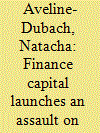|
|
|
Sort Order |
|
|
|
Items / Page
|
|
|
|
|
|
|
| Srl | Item |
| 1 |
ID:
091357


|
|
|
| 2 |
ID:
120630


|
|
|
|
|
| Publication |
2013.
|
| Summary/Abstract |
Over the past two decades, global market finance has taken root in China to seek property investment. This article examines the spatialities and anchorage methods of finance capital within Chinese national territory. It highlights the spatial and sectoral differences in the composition of property portfolios as a function of the return/risk coupling. These differences are exacerbated by a split in the geographical origin of the funds, which determines differentiated conditions of access to land and management of the investment time horizon of the assets portfolios. The penetration of finance capital into urban space tends to increase the fragmentation and functional specialisation of districts, a phenomenon fostered by entrepreneurial urban policies. As a result, urban projects are becoming standardised in terms of both design and program. They are increasingly governed by external references that favour the expansion of multinationals and transform lifestyles and consumer habits.
|
|
|
|
|
|
|
|
|
|
|
|
|
|
|
|
| 3 |
ID:
096011


|
|
|
|
|
| Publication |
2010.
|
| Summary/Abstract |
Private equity funds, particularly those headquartered in the U.S., have come under heavy attack internationally from civil society and regulators. At the same time, locally owned private equity funds have unexpectedly appeared in significant numbers across emerging markets. The analysis in this paper illustrates how actors that are only notionally domestic are introducing the neoliberal private equity model into Asian countries, particularly China and Korea.
|
|
|
|
|
|
|
|
|
|
|
|
|
|
|
|
| 4 |
ID:
173826


|
|
|
|
|
| Summary/Abstract |
Compelling trends in international affairs, such as the rise of private military companies (PMCs) and the increasing fragility of many nation-states, have caused some observers to question whether the state-centric, Westphalian world-order will exist in perpetuity. In this light, epochal change theory posits that world-orders have constantly changed and we are now witnessing a transition to a new one. In this paper, I discuss how small groups of private equity investors now control impressive war-fighting capabilities, and that this acquisition of PMCs by private equity firms is further evidence of epochal change theory.
|
|
|
|
|
|
|
|
|
|
|
|
|
|
|
|
| 5 |
ID:
182052


|
|
|
|
|
| Summary/Abstract |
In recent decades, public prisons and jails have increasingly outsourced operational functions by “turning over the keys” to private business and, more recently and specifically, to private equity. By the early 2000s, private equity-owned corporations had entered the core sectors of prison and jail operations, creating “markets behind bars” in telecommunications, commissary sales, health provision, and a range of other services. Two decades later, they have become a quasi-oligopolistic market force across the carceral economy. Reacting to these developments, scholars and activists have explored how private firms generate profits by extracting resources from families of the incarcerated. Less explored is the fact that it is often and particularly private equity firms that partner with public carceral institutions in these extractive practices. In this reflection, we propose a three-part schematic for understanding how such partnerships, with their attendant predation on the poor and people of color, have become normalized. We focus, first, on the mechanism of bureaucracy through which mutual profit-making by public and private entities becomes regularized; second, we explore the legal mechanisms—the apparently small but potent and politically unexamined legal maneuvers—that enable the redirection of family resources beyond the support of a loved one to the operational needs of jails and prisons; finally, we trace the role of gender as a social mechanism through which private equity and its prison/jail partners rely simultaneously on women’s traditional role as caretaker and non-traditional role as primary breadwinner. We show that all three mechanisms are crucial to the economic functioning of the carceral state.
|
|
|
|
|
|
|
|
|
|
|
|
|
|
|
|
|
|
|
|
|